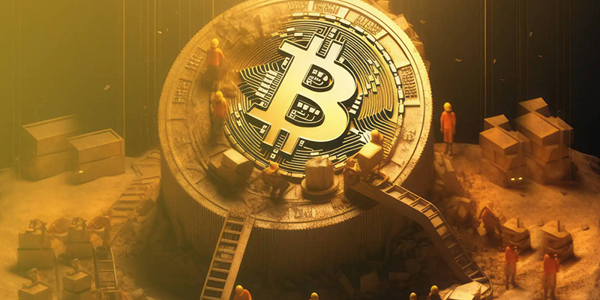The Basics of Cryptocurrency Mining: Is It Profitable?
Cryptocurrency mining is a term that has raised interest and controversy in equal measure. But what is it actually in? It is the act of proving transactions and generating new units of cryptocurrency with the help of computational resources.
Many people are interested in mining in anticipation of making a vast fortune. Mining is a challenging process, as anybody can imagine. On the one hand, fluctuations in the market, energy, and technological advancements pose challenges to miners.

But don't worry. In this article, we'll discuss the basics that you need to know about cryptocurrency mining. We will see how it works and whether it can line your pockets.
So read on as we discuss the mining industry in detail. Are you ready to learn the basics of cryptocurrency mining?
Let's get started!
What is Cryptocurrency Mining?
Have you ever wanted to know how people exchange bitcoins or do business using bitcoins without intervention from a bank? You're a digital detective, a forensic accountant, an investigator of the new age—it's all there.
They use powerful computers to solve complex mathematical problems known as puzzles. The solution allows the block to be added to the chain of blocks, also known as the blockchain.
The best way to imagine the blockchain is as a large, shared record book. Each solved block is a new page in this never-ending story of transactions in the book of records.
Miners get rewards in new coins for their efforts, and this system is called proof of work.
Mining helps maintain the integrity of the network and keeps the transactions going. Indeed, one cannot overestimate the role of miners without whom the entire system would stop.
Essential Key Factors Influencing Profitability
Mining profits are not fixed. They are like a rollercoaster with many fluctuations that can make your head spin.
First up, hardware. Those fancy mining rigs? They don't come cheap, so you will need to part with a considerable amount of money initially. Mining consumes electricity, and your profits could disappear if energy costs increase.
Crypto prices are also unpredictable and volatile, as depicted in the past few months. When Bitcoin goes up, miners cheer. When it crashes, those smiles disappear from the users' faces.
All these factors are always active. You're on a high one day, making lots of money, and the next, struggling even to make a dime. Smart miners monitor all these parts, as they are all interconnected.
Types of Mining: Solo vs. Pool Mining
When it comes to mining, you've got two main paths. Let's break it down.
Solo mining is like gambling, where you can strike it rich, but there are more chances you will not. Succeed at the slot machine, and everything is yours; hitting the jackpot means you get all the prizes. But it may take years before you get that big break.
Pool mining is team sport oriented. The guys team up, and the power of their computers is added together. You will receive less frequent but more consistent payments.
Single mining is more profitable and potentially profitable than pool mining but comes with more significant risks. Pool mining is more predictable for you, but the returns are comparatively low.
Choose wisely. Your mining strategy defines your crypto journey – or lack of it.
How to Calculate Mining Profitability?
Determining if mining will enrich your pocket is more accessible than calculating rocket science, but it is more challenging. Let's break it down.
First, consider the basic concept of profitability calculators. Input configuration data with your rig's hash rate and power consumption, current rates of cryptocurrencies, and—tada! Great; you now have a rough estimate.
The hash rate is how fast your setup can do calculations. The higher the hash rate, the better, which usually implies higher power consumption.

Market prices are the system's unpredictable element. They move in cycles like a pendulum and impact your revenues daily.
These numbers are dynamic, and you have to monitor them periodically. Specific geographical locations change faster than the desert sands; mining is one of them. It is better to be informed, and you may one day find yourself making profits.
Risks and Challenges
Mining crypto is not all glamour and glitter, as some may think. Market values are as constant as a drunken tightrope dancer. You may be up and happy one day and scratching your head the next, wondering where your profits are.
It is interesting to note that governments are uncertain about crypto. New rules, like whack-a-mole, emerge, sometimes transforming potentially promising money-making ventures into liquidity sinks.
Tech doesn't stand still. It would help if you had realized that energy costs can easily creep up on you. The most significant risk in mining is that electricity prices can go up.
Competition also means more challenging puzzles and less money to be made. It's like there are only a few chairs in the game, and with every round, people have to drop out, and there is nowhere to sit.
Understand The Basics of Cryptocurrency Mining
Now that you've learned the basics of cryptocurrency mining do not take this lightly. Crunch the numbers and consider your situation.
Talk to seasoned miners. They have been there and done that – they know the war stories. Their ideas can help you avoid some costly blunders. Join online forums and ask questions. The more one knows, the better off they will be.
Do not compare yourself to others as much as possible. What may be effective on them may not be effective on you. The direction that you have chosen in the mining industry is unique.
Take your time. Consider the basics, and you will decide when you are ready. Are you ready to start investing in mining?
Frequently Asked Questions
Q. What equipment is needed for cryptocurrency mining?
Ans: You will need a high-computing device or a hardware device known as an ASIC. Remember Internet connection and cooling systems.
Q. How does mining difficulty affect profitability?
Ans: Difficulty increases with the number of miners involved. This means one has to have more computational resources to solve problems and get more coins. Higher difficulty can reduce profits.
Q. Can I mine cryptocurrencies on my personal computer?
Ans: Yes, but it is not usual practice to make money from it. Many home PCs need to be more potent for mining, and specific mining rigs are preferable to general-purpose computers.
Q. Is mining legal in all countries?
Ans: No, it's not. Some countries embrace it, and others have banned it. This is to remind you that rules in the crypto world might change relatively fast.


